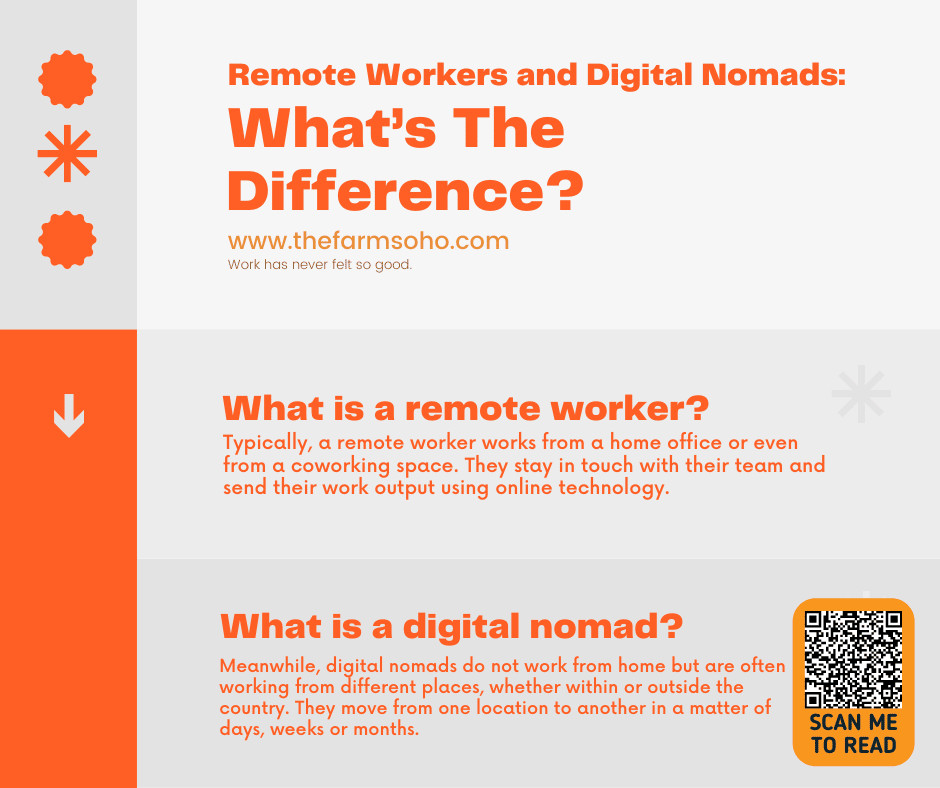Ready to see it for yourself?
One of our workspace experts will reach out to you based on your communication preferences.

Sometimes people get confused and interchangeably use the terms “remote worker” and “digital nomad.” However, the fact of the matter is that actually, they are not one and the same.
To clarify: all digital nomads can be considered remote workers but not all remote workers can be called digital nomads. In this blog, allow us to dig a little deeper and explain some of the main differences between the two:
Wikipedia tells us that a remote work is “an employment arrangement in which employees do not commute to a central place of work.”
Typically, a remote worker works from a home office or even from a coworking space. They stay in touch with their team and send their work output using online technology. Software such as Google Meet, Slack, and Zoom are among the most common communication tools used by remote workers when contacting their employers and collaborating with team members.

Remote workers normally have an employment contract. They are generally required to work during regular working hours.
A Forbes article published in November 2020 labeled remote work as “the biggest legacy of Covid-19.”
“Location will become less important in hiring,” contributor Gad Levanon wrote at the time. “More white-collar workers will live farther from city centers, in different parts of the U.S. and even outside the country, accelerating and changing geographic trends.”
Remote working or at least a hybrid work arrangement (which is a combination of on-site work and remote work) has now become the “new normal” for many companies worldwide.
From the looks of it, the flexible work model is not going away anytime soon.
Meanwhile, digital nomads do not work from home but are often working from different places, whether within or outside the country. They move from one location to another in a matter of days, weeks or months.
In short, they make a conscious decision to fully live the nomadic lifestyle. They do not stay permanently at any one single address.

BBC defined digital nomads as those “people who choose to embrace a location-independent, technology-enabled lifestyle that allows them to travel and work remotely, anywhere in the Internet-connected world".
Digital nomads have mastered the art of living out of a suitcase. They work from airports, coffee shops, hotels, subway stations, or even shared workspaces. In most cases, they are allowed to work at their preferred time and are not required to clock in. They typically avail of virtual mailbox services so they can still receive their mails and parcels while they’re on the go.
Remote workers enjoy greater flexibility compared with those who work on-site every day. For example, they can avoid the traffic and stress that come with morning and evening rush hour commutes. They do not have to commute daily. They can do their jobs from their bedrooms or anywhere in the home (as long as there is high-speed internet connection).
Another convenience of working from home is that workers don't have to wear office attire. In many cases, they only don formal upper wear – while still wearing boxer shorts or pajamas – for their Zoom meetings. Nothing beats the fun of wearing comfy clothes while working!

While the work-from-home arrangement brings greater work-life balance as the individual is able to spend quality family time, it can also be a source of distraction. Doing home chores and taking care of children’s needs during office hours can be a constant struggle for busy professionals.
Staying focused can be difficult.
Along with that, extroverts who love interacting with office workmates can experience feelings of isolation in this type of set up. This is one of the reasons why some prefer to work from a coworking space rather than their couch. That way, they can achieve greater levels of productivity while enjoying social interaction and collaboration opportunities.
One of the most attractive reasons why some prefer working as digital nomads is that it affords them the freedom to travel constantly. It’s possible to work from an Asian beach one month and a European tourist attraction the next. It all boils down to learning how to plan your schedule.
Digital nomads also do not exclusively work for a single employer. They can take on as many clients as their time allows. This ultimately means greater earning opportunities.

Meanwhile, staying connected to the internet can be a major challenge. This is specifically true in areas where poor connectivity is often a concern. This can lead to disruption of productivity. Creativity and resourcefulness are needed to overcome obstacles and meet deadlines.
Moreover, it is not always possible to work from a cozy place. It’s not always about sightseeing and fun in the sun. Working from a coffee shop, a coworking space, or even during travel may be necessary at times. The key is to do the day’s tasks from a place that encourages focus and productivity.
“Just because you don’t have to get out of bed is not a reason to work from bed,” freelancer and digital nomad Lindsay Maisel told CNBC. “The commute may be gone, but mentally (and physically) you need to go somewhere else to work.”
Another major drawback is that digital nomadism means living life away from friends and loved ones. While it’s always possible to stay connected via social media, being many miles away from everyone during special occasions can lead to loneliness. The lifestyle is definitely not recommended for everyone but only those who can handle it.
Some of the top job titles for remote workers and digital nomads include accountants, app developers, content writers, customer support representatives, graphic artists, language tutors, programmers, SEO specialists, social media managers, virtual assistants, and web designers. The opportunities are similar but it all depends on whether the company or client allows the applicant’s preferred work arrangement.
At the end of the day, “knowing the difference” between remote workers and digital nomads can benefit both businesses and online professionals alike. According to Forbes, doing so helps organizations “decide what suits them best.” On the other hand, it can also help professionals “make better choices about the type of work they’d like to do from afar and the kind of lifestyle they seek.”
Thinking of becoming a remote worker or a digital nomad? The Farm SoHo coworking spaces are ready to welcome you!
Give us a call o (917) 722-5027 or send us an email via [email protected] if you have any inquiries. We’d be glad to answer your questions or even give you a tour of our amazing coworking facilities.


Are you looking for a NYC event venue for personal or business occasions? Do you need a fresh perspective for your workday, a business address or virtual mailbox? If it’s time to level up your business and you’re looking to make some serious marketing moves, we have the answer for you!